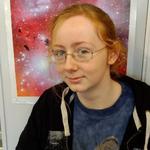Fellow Detail

| Name | Becky Arnold |
|---|---|
| Affiliation | University of Sheffield |
| Department | Physics and Astronomy |
| Group | Astrophysics |
| Research area code | (F5) Astronomy |
| Fellowship Inauguration Year | 2018 |
| Institutional Website | http://www.astro.group.shef.ac.uk/ |
| ORCID | 0000-0003-0355-0617 |
| Interests | I am interested in the formation, evolution and dynamics of star clusters. In particular I am interested in developing techniques for quantifying the structure and dynamics of these clusters so they may be studied in a more direct and quantitative way. |
| Short Biography | I completed my undergraduate degree in physics at the university of Manchester and I am now in the third year of my astrophysics PhD at the university of Sheffield, where I study the evolution of star clusters using computer simulations. Star clusters take millions of years to evolve, so observations can only show us snapshots. As a result computer simulations are a extremely valuable tool which allow us to study the entire lifetimes of these clusters. Part of my research has focused on binary clusters, which are star clusters found in pairs. It has largely been assumed that the two clusters form as they are i.e. as two distinct clusters which are close together. However if this were the case simulations show that the clusters would merge relatively quickly (a few million years), but binary clusters older than this are observed. I used simulations to show that single star forming regions may divide into two distinct clusters, and argued that this may be how these binaries form. Currently I am developing a technique to quantify velocity structure in star clusters. Several methods for quantifying the spatial substructure of star clusters have been developed over the years, and have proved invaluable in helping astrophysicists to study star clusters in a quantitative way. However no similar techniques exist for quantifying velocity structure. This is reasonable, as up until recently there has be little high quality velocity data available, but with the advent of new telescopes such as Gaia, and longer baseline measurements this is changing. I hope this new method will allow this wealth of new data to be analysed in a practical and consistent way. |
Previous events
| Title | Start date | End date |
|---|---|---|
| No event. | ||